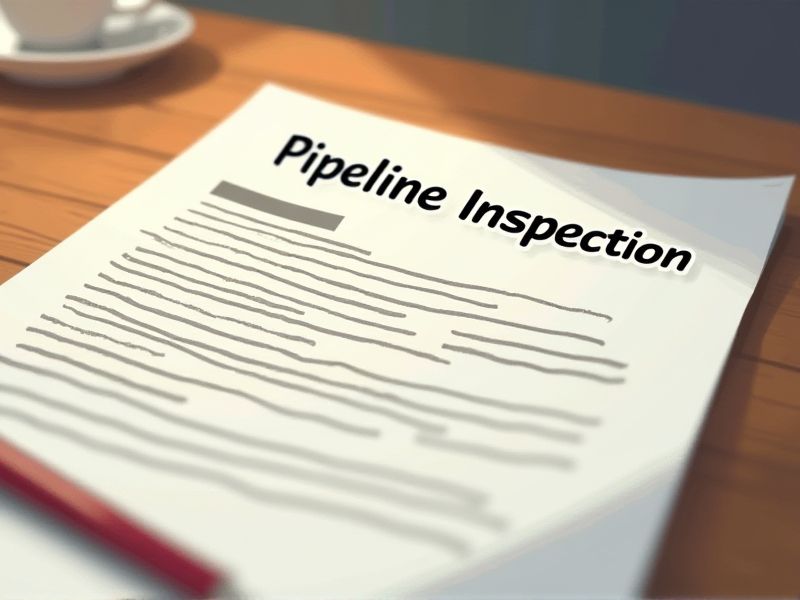
Pipeline inspection specialists play a critical role in maintaining the integrity and safety of pipelines, which are vital for transporting energy resources. This role demands specialized knowledge and skills to identify potential issues that could lead to costly damages or environmental hazards. Certifications ensure that specialists are equipped with industry-recognized expertise and adhere to rigorous standards of practice. Key certifications necessary for a pipeline inspection specialist are outlined here.
API 1169 Pipeline Construction Inspector Certification
The API 1169 Pipeline Construction Inspector Certification provides a standardized measure of an inspector's knowledge and skills, which ensures all inspectors have a consistent understanding of industry practices. This certification is crucial in reducing the risk of errors and accidents during pipeline construction, promoting safety and reliability. Companies demand certified inspectors to comply with regulatory requirements and fulfill contractual obligations critical to project approval and funding. Inspectors with this certification are more likely to meet industry expectations, leading to enhanced credibility and job opportunities.
API 510 Pressure Vessel Inspector Certification
API 510 Pressure Vessel Inspector Certification is essential for a Pipeline Inspection Specialist because it ensures thorough understanding of pressure vessel codes and standards, enhancing safety compliance. It provides in-depth knowledge of inspection techniques, crucial for accurately assessing the integrity of vessels involved in pipeline operations. This certification fosters a high level of competency, reducing the risk of failures associated with undetected defects. Employers often require such certification to validate the expertise and reliability of inspectors in complex inspection scenarios.
API 579 Fitness-For-Service (FFS) Certification
The API 579 Fitness-For-Service (FFS) Certification is needed for a Pipeline Inspection Specialist to ensure the structural integrity and safety of pipeline operations. Possessing this certification enables specialists to accurately assess defects and degradation in pipelines, thus preventing potential failures. Compliance with API 579 standards assures stakeholders that the individual is equipped to handle complex inspection challenges and make informed maintenance decisions. Earning this certification reflects a commitment to industry best practices and can enhance career advancement opportunities for professionals in the field.
ASNT Level III Ultrasonic Testing (UT) Certification
Possessing an ASNT Level III Ultrasonic Testing (UT) Certification demonstrates a high level of proficiency and knowledge, crucial for ensuring the structural integrity of pipelines. The certification verifies the technician's ability to detect and evaluate defects, thereby directly reducing the risk of pipeline failures and potential hazards. Regulatory and industry standards often require or recommend this level of certification to meet safety and quality guidelines. Companies benefit from enhanced credibility and assurance of compliance through employing certified professionals.
ASNT Level III Radiographic Testing (RT) Certification
ASNT Level III Radiographic Testing (RT) Certification validates the specialized expertise required for accurate pipeline inspections, ensuring anomalies are correctly identified. Pipelines often carry hazardous materials, necessitating stringent inspection standards to prevent environmental and safety hazards. This certification demonstrates a high degree of technical proficiency, which is critical for interpreting complex radiographic images. Obtaining ASNT Level III RT Certification assures stakeholders of the inspector's competency and reliability in maintaining pipeline integrity.
AWS Certified Welding Inspector (CWI)
The AWS Certified Welding Inspector (CWI) credential signifies expertise in welding standards, essential for ensuring pipeline safety and integrity. In pipeline inspection, the CWI's skills contribute to the identification of critical weld defects that could lead to system failures. Regulatory standards often require CWI certification to comply with safety guidelines in the energy sector. Possession of the CWI certification by specialists can enhance the credibility and reliability of pipeline inspection reports.
NACE Coating Inspector Program (CIP) Certification
NACE Coating Inspector Program (CIP) Certification is required for Pipeline Inspection Specialists to ensure adherence to international standards for coating applications, thus maintaining pipeline integrity. Certified inspectors possess specialized knowledge that significantly reduces the risk of pipeline corrosion, contributing to enhanced safety and prolonged lifespan of infrastructure. Employers recognize CIP Certification as a benchmark of competence, which aids in compliance with regulatory requirements and industry best practices. The demand for certified professionals often results in increased career opportunities and recognition within the field.
In-Line Inspection (ILI) Technician Certification
In-Line Inspection (ILI) Technician Certification ensures a pipeline inspection specialist possesses the required technical skills to accurately assess pipeline integrity. The certification validates the capability to identify and evaluate defects or anomalies within the pipeline system. Having certified technicians reassures regulatory bodies that inspections comply with industry standards and safety protocols. Consequently, pipeline operators reduce the risk of failures or environmental incidents, safeguarding both assets and public safety.
OSHA 30-Hour General Industry Safety Certification
Pipeline Inspection Specialists work in high-risk environments, where safety standards are crucial to prevent accidents. The OSHA 30-Hour General Industry Safety Certification provides comprehensive safety training tailored for industrial settings. This certification educates specialists on hazard recognition and regulatory compliance, essential for maintaining safety in pipeline operations. With these qualifications, specialists can effectively mitigate risks, enhancing overall workplace safety and efficiency.
ISO 9001 Quality Management System Auditor Certification
ISO 9001 Quality Management System Auditor Certification equips a Pipeline Inspection Specialist with standardized auditing skills, ensuring consistency and reliability in inspections. It enhances a specialist's ability to identify and rectify process inefficiencies, thereby improving the overall safety and integrity of pipeline systems. Companies often require this certification to meet regulatory compliance and industry standards, fostering trust and credibility with stakeholders. A certified auditor can significantly reduce the risk of failures and costly downtimes in pipeline operations by systematically monitoring and evaluating quality management practices.
Summary
When you, as a Pipeline Inspection Specialist, obtain certifications, your credibility in the industry significantly increases. This enhanced reputation often leads to more job opportunities and, potentially, higher income. Certifications equip you with advanced skills and knowledge, improving your efficiency and accuracy in the field. Organizations often prefer certified specialists, which can result in more projects and long-lasting professional relationships.
